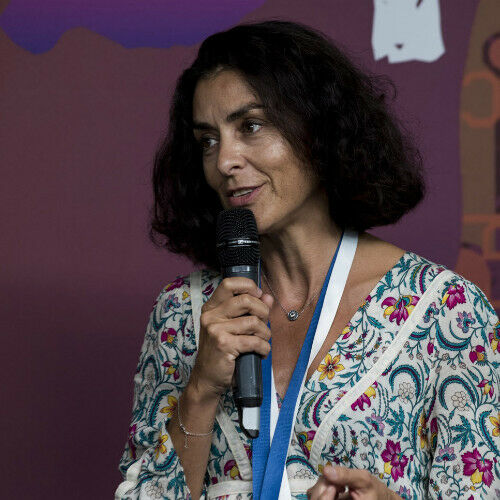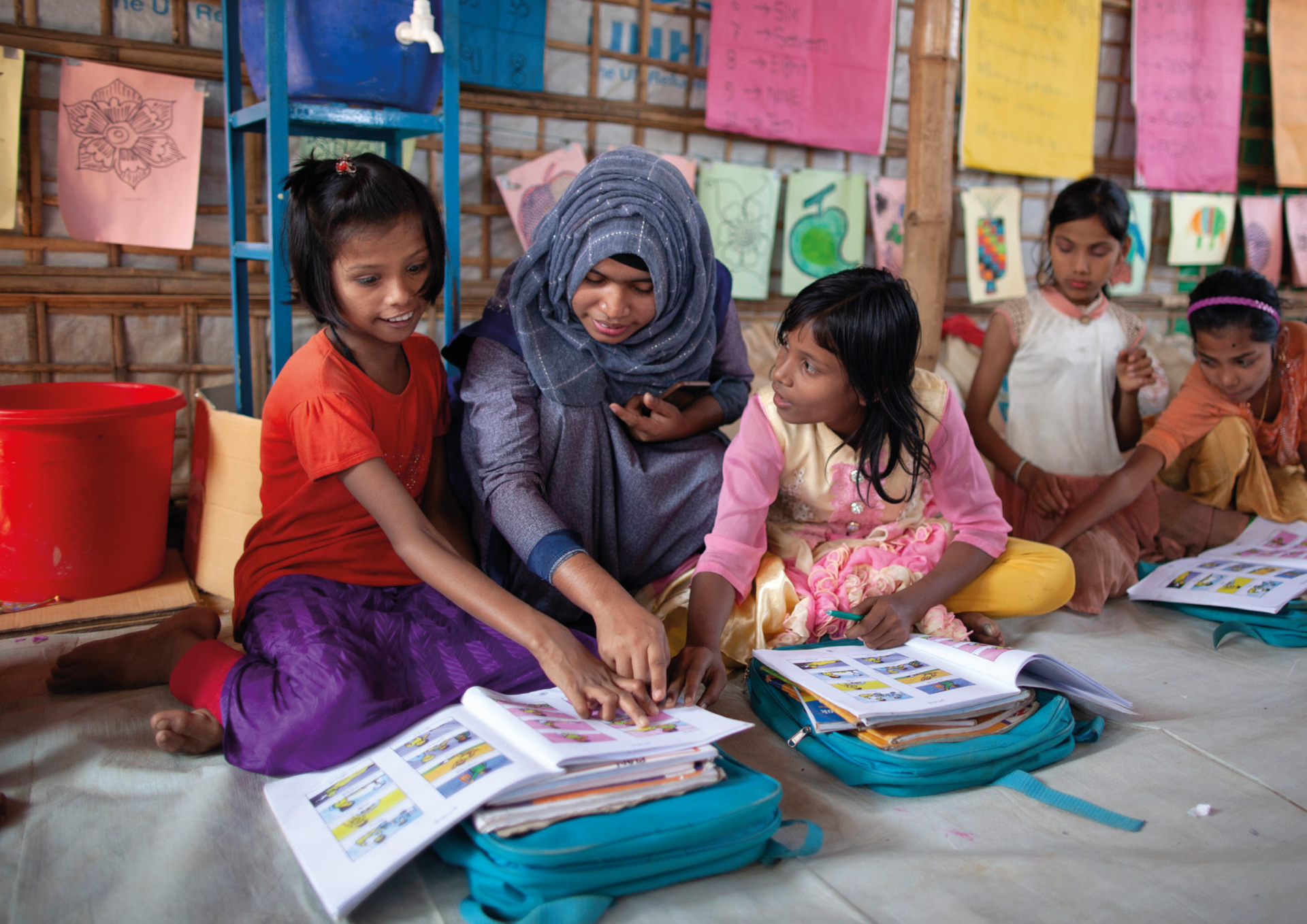
Please tell us about UNICEF's Education Cannot Wait (ECW) Fund and the importance of education in emergencies.
Laurence Julliard: Education Cannot Wait (ECW) is the United Nations global fund for education in emergencies and protracted crises. The Fund addresses the importance of education in times of crisis, including natural disasters, armed conflicts, forced displacement, and other circumstances. This specific fund aims to keep supplying these children with quality education in crisis situations, providing them with opportunities to continue learning despite challenges in their respective countries.
Research has shown that when children are unable to attend school, they are exposed to increased risks of abuse and exploitation, forced recruitment by armed groups, child labour, child marriage and gender-based violence. ECW’s purpose is to help these children access quality learning environments, stay in school and reach their full potential. With the support of strategic donor partners, ECW’s investments focus on holistic learning outcomes, transforming global financing data, responding to climate change, placing localisation and community participation at the core of future investments, and advancing commitments to gender equality, disability inclusion and targeted responses to forced displacement.
Sarah Urben: ECW is a global fund, hosted by UNICEF, and designed to provide immediate education support in times of crisis. ECW supports both immediate, rapid response to education needs in sudden-onset emergencies, and facilitates joint humanitarian and development multi-year programming and financing in protracted crises. Its purpose is to rapidly respond and offer quality education in emergencies worldwide.
How did the scope of the ECW High-Level Financing Conference evolve?
Laurence Julliard: As we strategised with the ECW team, looked at the logistics and considered the content, message and audience, we identified a number of key areas to ensure a cohesive, dynamic event.
Sarah Urben: Together with the ECW Team, we identified needs and responded quickly to provide the necessary resources to ensure an amazing event. To deliver on the scope and vision of this global conference we brought in different teams to handle content, logistics, and creative aspects, audio-visual and other key components of the highly successful High-Level Financing Conference.
Laurence Julliard: The strategic part was really looking at how we could help them to ensure the exhibition area had a greater impact and engage their global audience of donors, government representatives, civil society, the private sector, youth, beneficiaries and other key partners. We believed that in order to encourage people to donate, they needed to hear and read stories, not just from big organisations, but unique stories from the children themselves. They needed to hear stories about their teachers and understand what was happening on the ground. Emotionally connecting with these stories would encourage people to donate.
Building on ECW’s, #222MillionDreams and #PostcardsFromTheEdge campaigns, along with the broad collection of human stories, photos and assets available, we worked together with the ECW team to create a cohesive narrative, feel, brand and message for the attendees.
ECW is a great cause, and throughout the event preparation and delivery we went above and beyond to ensure cost-effectiveness, impact and quality.
Tell us about your strategy to emphasise the need for education in emergencies.
Laurence Julliard: The strategic focus was on identifying the key stakeholders who wanted or needed to be present at the ECW event. Working in close collaboration with the ECW team, we aimed to transform their presence into a journey that would effectively convey the children’s stories and ultimately inspire donations for education in emergencies. It was crucial to create an emotional connection, giving them not only a space to talk and exchange ideas, but also fostering a human connection.
You could see this in the beautiful pictures of children with their dreams from Education Cannot Wait’s #222MillionDreams Campaign, saying: “What's your dream? I want to become a doctor. I want to be a teacher." Those pictures spoke volumes.
To build on ECW’s Postcards From The Edge Campaign and create an interactive user experience, we created an interactive exhibit with audio recordings so event participants could hear these voices first hand, share their experience via social channels and build on the cohesive, integrated nature of the conference.
One of the children described a devastating experience: "I was with my mom when we had to flee. There was gunfire for three months, and they killed my mom. Now, I'm nine, and I don't know what will happen to me. I don't think I'll see my home again. I think I might get killed too." The child continued, "But I want to go back to school. My mom is gone, but I want to become a doctor."
The power of those words and the impact of the images were immense. It helped connect people to those who are doing the right things so that their donations would directly support them. That's how we built the journey, together with ECW, and it was incredibly impactful.
Sarah Urben: Additionally, we allocated space on a multimedia wall for ECW’s partners to share their content through photos and videos. There was also a digital bar where organisations showcased their various apps and digital solutions. We set up a library with dedicated office space for distributing flyers, books and other materials. Another significant feature was the youth zone, as Education Cannot Wait invited approximately 100 young people from around the world to share their stories and perspectives during the conference in Geneva. It was fascinating to see ministers engaging with these young individuals.
This vision of making a significant impact was shared by the production team, the creative team, Education Cannot Wait, and partners like The LEGO Foundation. Everyone's collaboration and connection were crucial in bringing this concept to life. It wouldn't have been possible without everyone being united and working together.
Laurence Julliard: To ensure a cohesive narrative, we worked with the ECW team to support content articulation, handle speaker briefings and provide support for the conference from a content standpoint.
Sarah Urben: We also worked on digital assets. We worked closely with ECW’s team to develop compelling videos for the opening session and other key conference moments, and a significant amount of effort went into preparing the moderators' briefing and script. So, indeed, there was a lot happening and many tasks to handle.
The core team from our side was relatively small. While there were around 50 people from MCI involved in total, the core team consisted of approximately five or six individuals who primarily handled the coordination and management of the project. Each team member brought their own expertise and had their own supporting team behind them.
We received great support from the MCI strategic planning team in Geneva, particularly Suzanne Fellay, who pushed the boundaries of the exhibition. Working with the client, we helped to create a vision for the conference that went beyond your ordinary UN event.
I also want to mention Dorier, MCI’s audiovisual experience design agency – they didn't just execute the project; they went above and beyond what they were asked to deliver in many aspects. ECW had a strong commitment to inclusivity for this conference, and Dorier had someone dedicated to ensuring inclusivity throughout the process.
Laurence Julliard: Avinash Chandarana, MCI's Director of Learning and Development, spearheaded the initiative to bridge the gap between the digital and physical worlds. This was a specific program to drive engagement for the online attendees, to encourage donations from them as well. It was very successful.
Additionally, we provided coaching to youth speakers. That was something I personally took on. It was important to train and coach the individuals we brought in to share their stories on the stage. We put a lot of effort and passion into listening to their stories.
It was just very, very human. Apart from young people, we also had refugee and crisis-affected teachers telling their stories. I remember one individual was so nervous. I did probably three hours of coaching with her – when she got on stage, she brought the crowd to its feet.
It also brought our team together. Honestly, this was a very moving project.
US$826 million was announced at the ECW High-Level Financing Conference, and for their contribution to the success of this project, MCI won a XAVER award for Best Corporate Event.
Meet Avinash and other MCI leaders in our article on Enhancing Marketing and Customer Engagement with AI.
Read about MCI and Dorier's collaboration on another humanitarian cause here: Designing a gala programme for Swiss Red Cross.




